|
|
|
Sort Order |
|
|
|
Items / Page
|
|
|
|
|
|
|
| Srl | Item |
| 1 |
ID:
165323
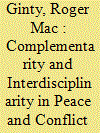

|
|
|
|
|
| Summary/Abstract |
This essay unpacks some of the nuances and complexities of peace and conflict studies. While it accepts that there are divisions between those who study conflict and those who study peace, it argues that there are also multiple sites of overlap and complementarity. Many of those who study topics labeled as “peace” are actually studying conflict, meaning that we have a complex “masala” of peaceandconflictstudies. Moreover, trends within social science research more broadly reflect the increasingly interdisciplinary nature of recent work.
|
|
|
|
|
|
|
|
|
|
|
|
|
|
|
|
| 2 |
ID:
144067
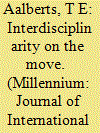

|
|
|
|
|
| Summary/Abstract |
This contribution to the forum discusses The Status of Law in World Society from the perspective of interdisciplinary research in International Law and International Relations. While problematising the mediation on interdisciplinarity itself, I suggest that the remainder of the book is an example of reflexive interdisciplinarity, which uses cross-disciplinary encounters to learn about disciplinary blindspots, hidden assumptions or silences, and to destabilise its certain knowledges and common senses. This is interdisciplinarity as counter-disciplinarity proper. Kratochwil shows how interdisciplinary research can be a non-imperialist, enriching and stimulating conversation, precisely because it refrains from dictating this in the form of a set research agenda with a delineated roadmap. The Status of Law instead highlights the scholarly merits of posing questions, being puzzled and having contestations as more important and productive features for our academic endeavour and interdisciplinarity itself.
|
|
|
|
|
|
|
|
|
|
|
|
|
|
|
|
| 3 |
ID:
112421
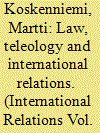

|
|
|
|
|
| Publication |
2012.
|
| Summary/Abstract |
Interdisciplinary approaches often bemoan international law's lack of theoretical sophistication and naïve utopianism. Instead of offering effective tools of governance, it seems committed to outdated ideas about an international public realm and a dubious teleology of progress. This essay - given as the E. H. Carr lecture at the University of Aberystwyth in 2011 - reviews efforts to reform international law into a science and a more efficient instrument of international rule. Such efforts have been a part of international law's internal development but their lack of success depends on a mistaken view of the field as a 'discipline' - a set of theoretical or technical propositions. This essay defends a view of international law as an argumentative practice in which political claims are defended and attacked, rather than as a governance tool or institutional blueprint. At its worst, law may buttress bureaucratic privilege. At its best it may offer, for a cynical world, a vocabulary for imagining better futures. It may also sharpen political thought and strategic awareness, but it cannot replace them.
|
|
|
|
|
|
|
|
|
|
|
|
|
|
|
|
| 4 |
ID:
184429


|
|
|
|
|
| Summary/Abstract |
The emerging and vibrant field of environmental humanities to date has not received considerable attention in Central Asia. In light of the Anthropocene crises, there is a real urgency for maturing this field and investigating the methodological and epistemological challenges that environmental topics demand, often working across disciplinary habits and time scales. This roundtable brings together Central Asianists from a range of backgrounds to discuss the sources and scales of their investigation, their challenges and potential. The contributors discuss how particular kinds of sources such as climate models, archival manuscripts, ethnographic fieldwork and media analyses have been used to understand environmental changes in the region. In what ways do the traditions of scholars’ disciplinary training guide the scale of analysis? Looking toward the future of environmental humanities in Central Asia, this roundtable suggests paths for developing this vital field of enquiry.
|
|
|
|
|
|
|
|
|
|
|
|
|
|
|
|
| 5 |
ID:
140112
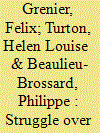

|
|
|
|
|
| Summary/Abstract |
Since the inception of International Relations (IR) within university departments, its disciplinary status has been the subject of constant debate. Yet, the current literature on ‘the state of the discipline’ silences this debate either through IR’s assumed disciplinarity or conflation of debates about theory with the existence of IR. This Forum moves beyond this literature by explicitly engaging whether IR is a discipline or not and by enquiring how this status matters. Contributors rely on the sociology and philosophy of social science to call into question or affirm the disciplinarity of IR to argue whether IR is as a subfield of Political Science, a full-blown and autonomous discipline, or a hybrid field of interdisciplinary studies. Furthermore, contributors reveal the implications of the different disciplinary statuses regarding the academic institution, interdisciplinary possibilities and modes of organizing IR. Overall, these contributions aim to engage rather than close the disciplinary debate, creating further space for reflection.
|
|
|
|
|
|
|
|
|
|
|
|
|
|
|
|
| 6 |
ID:
102938
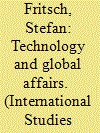

|
|
|
|
|
| Publication |
2011.
|
| Summary/Abstract |
Technology has always played an important role in global politics, economics, security, and culture. It has continuously shaped the structure of the global system, its actors, and the interactions between them and vice versa. However, theories of International Relations (IR), and in particular those of International Political Economy (IPE), have performed little to theoretically conceptualize technology as a powerful factor within explanations of change in global affairs. Although technology often is implicitly present in the theories of IR and IPE, it is often interpreted as an external, passive, apolitical, and residual factor. This essay argues that to develop a better understanding of transformation in global affairs, technology has to be integrated more systematically into the theoretical discussions of IR/IPE. Technology should be understood as a highly political and integral core component of the global system that shapes global affairs and itself is shaped by global economics, politics, and culture. This paper makes the case for an interdisciplinary approach, which systematically incorporates insights of Science and Technology Studies (S&TS) to provide a better understanding of how technology and the global system and politics interact with each other. In so doing, it opens the field to a richer understanding of how global systemic change is impacted by technology and how global politics, economics, and culture impact technological evolution.
|
|
|
|
|
|
|
|
|
|
|
|
|
|
|
|
|
|
|
|
|